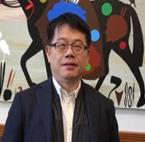Invited Speaker----Dr. Cheng-Di Dong

Professor, Department of Marine Environmental Engineering at National Kaohsiung University of Science and Technology, Taiwan
Dr. Cheng-Di Dong is a Distinguished Professor at the Department of Marine Environmental Engineering at National Kaohsiung University of Science and Technology (NKUST). He is also the Dean of Marine Research and Development and the Director of Sustainable Environment Research Center and Center for the study of Sediments of NKUST. He earned a Ph.D. degree in Environmental Engineer from University of Delaware in 1993. His current research interests are broadly clustered in the areas of monitoring and remediation of contaminated water, soil and sediments. He is particularly interested in developing fate and transport of contaminants in marine sediments, and remediation of contaminated sediments for the purpose of reuse sediment materials using physical, chemical and biological processes. Prof. Dong has participated in the scientific committee of several conferences and associations and serves as a reviewer in a wide range of international renowned journals. He has published more than 150 papers in leading international journals and edited 5 special issues of scientific journals.
Speech Title: Synthesis, characterization and evaluation of alkaline modified-biochar from spent coffee ground for removal of antibiotic from aqueous solution
Abstract: Antibiotic is one of the most widely used medicines in preventing microbial infections. The occurrence of high concentration of antibiotic further poses an important public health issue that is the induction of antibiotic-resistant pathogens. Therefore, an effective and economical treatment solution for antibiotic removal is highly desired for environmental scientists and engineers. In this study, Fe-SCG biochar was functionalized by modifying spent coffee ground (SCG) with alkaline and applied for oxidative removal of antibiotic‒tetracycline (TC) with the presence of persulfate (PS). From the mechanism study we found out that TC was mainly degraded through oxidation with SO4•- radicals. A substantial improvement in degradation efficiency for TC was observed when both Fe-SCG and PS were added. The significant effects of pH, initial TC concentration, the dosages of PS and catalyst on the TC degradation efficiency were also demonstrated. A high efficiency of more than 95% was obtained by Fe-SCG/PS at pH 2.0, [PS] = 30 mM, [TC] = 1 mM and [Fe-SCG] = 2.5 g/L. These results revealed that Fe-SCG activated PS oxidation can be applied in the future as a promising cost and environment effective solution for TC removal from aqueous solution in the future.



